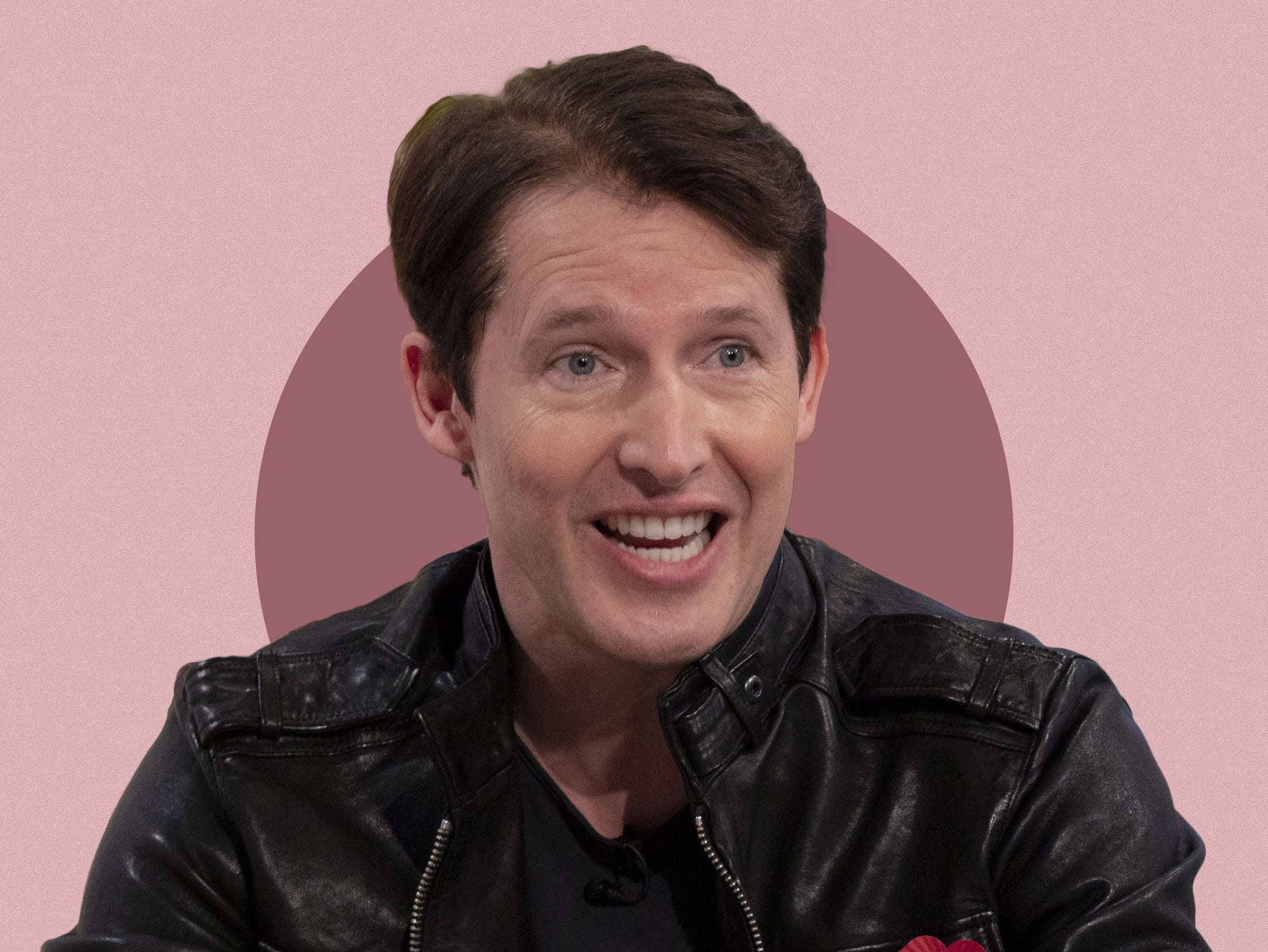From Blunt to Bublé: How cheesy popstars gave themselves a free pass by pretending to be in on the joke
As James Blunt prepares to inflict a Greatest Hits album on the world, Ed Power examines how he – along with Michael Bublé, Josh Groban and John Mayer – has successfully revived his image by being first to the punchline

In 2014, James Blunt spent the summer travelling the world in a space suit. The “You’re Beautiful” singer was on tour promoting Moon Landing, his fourth studio album and a project Rolling Stone described as “emotionally lopsided” and bedevilled by the singer’s “agitated whimper”.
Wimpers aside, under the spotlight, Blunt arrived with a bang. In a droll nod to the LP title, he and his band performed as astronauts in Nasa flight suits (minus the helmet, which would have rendered him inaudible – a plus or minus depending on your opinion of his music). During the show, he would sometimes explain “moon landing” referred not to space travel but to what happened when two people sharing a dressing room bent over at the same time so that their bums touched.
You could see Blunt’s tactic: to steam-roll any naysayers in the building with wit and self-mockery. It was an ingenious strategy – but by no means unique to Blunt. Along with fellow arena chest-thumpers Josh Groban and Michael Bublé, and show-off guitarist John Mayer, he’s part of a generation of cheesy artists who have mastered the art of ironic naffness. He’s having his cake while also winking and letting the haters know cakes are silly and that’s he’s entirely in on the joke.
The approach has worked miracles for all these headliners. The more they clown about in between songs and on social media, the more inclined the world at large is to give their music a free pass. In Blunt’s case, especially, the transformation has been remarkable. The wavy haired crooner, who releases his career retrospective The Stars Beneath My Feet (2004-2021) on Friday, was once the most hated man in pop.
The former army reconnaissance officer had staged a full-frontal charge on the charts in 2005 with “You’re Beautiful”. That tune was inspired by a chance encounter with an old girlfriend on the Tube: she was with her new partner and Blunt watched them from afar before running home to alchemise his heartache through music. It topped the charts in 10 countries. In the UK, it spent five weeks at number one. And it turned Blunt into Britain’s number-one punch bag.
The case against him wasn’t merely that he was soppy. It was that the Harrow old boy and former member of the Household Cavalry Regiment was soppy and posh. And to be heartfelt and blue-blooded was a double infraction against which there was no comeback. Or, as the NME put it, Blunt was “boring-but-inexplicably popular”. The same publication named Blunt’s debut, Back to Bedlam, the worst album of 2004.
Seventeen years later, Blunt has reached the milestone of his first “best of” compilation. Yet, instead of a posh public enemy, he stands before us as a stealthy national treasure. He’s pop’s geezer number one. You might not want front-row tickets to one of Blunt’s concerts, but you may very well be amenable to having a pint with him. Blunt commands a sneaking regard even among those who’d happily never again listen to his music.
How did this turnabout happen? The answer is that Blunt worked out you can get away with nearly anything in life – up to and including writing “You’re Beautiful” and going to Harrow – provided you’re funny and deprecating. Exhibit A in this regard is his Twitter account. Blunt has gone above and beyond in poking fun at himself. “I never liked the sound of my own voice. Till it made me rich,” he replied to one unkind tweet in 2013. “For Lent, I’ve given up music,” he wrote two years later. “There is a god”.
In 2020, an anthology of his best tweets was published as How To Be A Complete and Utter Blunt. And last month, he plugged his new compilation by tweeting “Just when you though it was safe to go back outside”. This was accompanied by a short film in which a woman erupts in screams when confronted by Blunt walking down the road with his guitar and busker’s drum-kit.
Enjoy unlimited access to 100 million ad-free songs and podcasts with Amazon Music
Sign up now for a 30-day free trial. Terms apply.
ADVERTISEMENT. If you sign up to this service we will earn commission. This revenue helps to fund journalism across The Independent.
Enjoy unlimited access to 100 million ad-free songs and podcasts with Amazon Music
Sign up now for a 30-day free trial. Terms apply.
ADVERTISEMENT. If you sign up to this service we will earn commission. This revenue helps to fund journalism across The Independent.
Does Blunt truly believe his music is a hellish stain upon humanity? Obviously not. However, in hinting he might possibly be in on the joke about his perceived naff qualities, he’s acquired the rock equivalent of a Get Out of Jail card. All musical sins are forgiven.
He is one of that distinct sub-category of cornball male stars whose music is generally derided as syrup on a stick, but who have discovered that critical slings and arrows are easily dodged if you pretend you’re aware how terrible you are perceived to be. With a flash of wit or humility, a lifetime of brownie points are yours.

Blunt is indisputably the Olympic champion at performatively beating yourself up before the reviewers get to you. Still, it’s a crowded podium. Among those pushing him all the way are the aforementioned Josh Groban, Michael Bublé and John Mayer (not a crooner but someone whose guitar solos make you question the existence of God the way Blunt does when bearing down on the chorus of “You’re Beautiful”).
Groban provides a particularly instructive example of a star who, in the normal course, could expect to be figuratively clapped in chains and pelted with fruit. Instead, he has reinvented himself through the art of self-mockery.
He learnt the hard way his music was not going to be enough to win over the wider world. “Thin and insipid” was The Independent’s appraisal of his LP, All That Echoes. “A one-note songwriter,” said the BBC – not renowned for its critical maulings. The consensus was that Groban couldn’t have been any cheesier were he sprayed down with liquified Wensleydale.
But Groban quickly revealed his super-power: that he was a hoot in concert. Contradicting his image as an overgrown choir boy, he would joke extravagantly about how sorry he felt for all the boyfriends and husbands dragged out against their will. On one tour he even hosted a Q&A session in which he vibed off the audience. He appeared to be having a lot more fun trading zingers than belting out his sub-Broadway takes on “It’s Now Or Never” and Robbie Williams’ “Angels”.
Few would mistake Josh Groban for musically credible. And yet nobody could nowadays claim he was piously naff
All that riffing and quipping has had the desired result. Few would mistake Josh Groban for musically credible. And yet nobody could nowadays claim he was piously naff. The New York Times has praised his “inordinately charming stage presence, his cherubic features and tousled long locks”; Rolling Stone heralded him as “very funny on social media and talk shows”. He’s off the hook.
His career has marched in lockstep with Blunt’s. Both broke through in the early 2000s. So it’s hard to tell if one has influenced the other in terms of image management. What is indisputable is that social media has been a godsend for both. In Groban’s case, the “coming out” ceremony as a good sport with a sense of humour happened in 2011 on Jimmy Kimmel Live! There, he “sang” a selection of Kanye West tweets in a “Grobnian” style. Later, he turned up in US sitcoms It’s Always Sunny In Philadelphia and The Office, the latter after he was contacted by the show’s Mindy Kaling on Twitter.
“Maybe there’s stigma to more classically infused music, that it’s older-skewing,” Groban confessed to Vulture in 2015 about this perceived squareness, “but the more I can get out to my age group and younger, it’s like, I’ve liked this stuff since I was your age – we’re all weird together.”
Next we come to Michael Bublé, whose 2011 Christmas album has shifted 12 million copies worldwide, placing it in the top 25 best-selling records of the 21st century. As with Groban, his live shows are full of quips about how no man would willingly attend one of his concerts. And there will be joke after joke at his own expense – in addition to impersonations of the Pope and single entendre exchanges with his backing band that go on longer than his Sinatra covers.
Bublé tends to keep to himself on social media (though he has discovered the joys of TikTok). On Twitter, Blunt’s greatest rival has historically been John Mayer. The musician is worshipped by guitarists for his flagellating technique. Among the wider public, he is better known for his brisk love life – he’s dated Katy Perry and Jennifer Aniston and was the inspiration for Taylor Swift’s “Dear John”. And for his colourful and often bizarre tweets.
“Yogurt does nothing. Creamy nonsense,” he informed his 1.4 million followers in 2017. “Confession: while I’m annoyed by people who talk loudly/act obnoxiously in public, I secretly admire their lack of self consciousness,” he added several months later. Can you be any more in profound in 280 characters or fewer?

Mayer recently took his playful trolling to the next level with an album of knowingly toe-curling 1980s “yacht rock” tributes called Sob Rock. It was his biggest hit in years, suggesting people prefer John Mayer, ironic joker, to John Mayer, preening rock god.
James Blunt’s strategy of bantering with his detractors has, meanwhile, become so successful that he has ended up a victim of his own hilarity. After a few years of abusive Tweets coming his way, he noticed strangers were no longer taking potshots. He had “won” the internet. It was devastating. “The sadness is that people have stopped being abusive to me. I’ve got no material to work with,” Blunt lamented to the Guardian in 2013.
Just last week he said he had learnt to turn online negativity to a plus. In a way, he’s cracked the unsolvable puzzle. He’s worked out how to beat the internet at its own game. “I’ve learned to cash in on it,” he told PA. “It’s a joke, because I go on tours around the world and I am lucky enough to play arenas of up to 20,000 people a night.”
A cosmos without James Blunt torching randomers on Twitter is one that is so much poorer. Yet the disappearance of the haters also highlights Blunt’s success. Not even online vitriol – the most toxic substance known to mankind – can withstand the forcefield projected by a kitschy singer with a sense of humour.
Blunt is a past master of the tear-streaked power ballad. But as he proved when he strapped himself into a space suit all those years ago, what is truly out of this world is his ability to weave hate into comedy gold.
‘The Stars Beneath My Feet (2004- 2021)’ is released on 19 November



Join our commenting forum
Join thought-provoking conversations, follow other Independent readers and see their replies
Comments